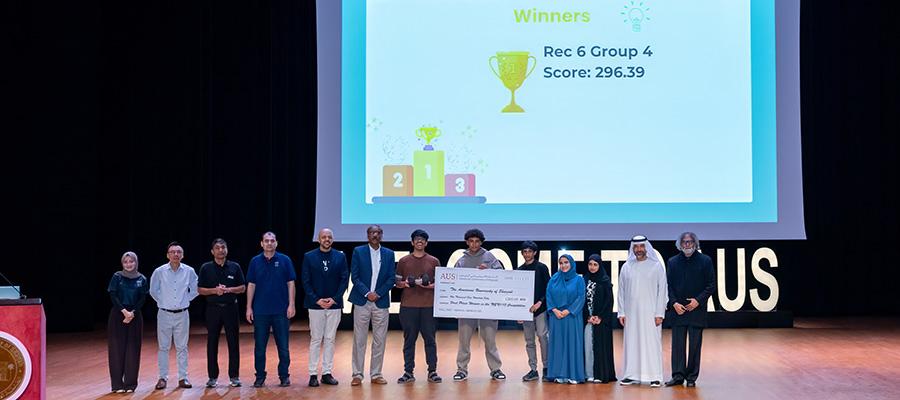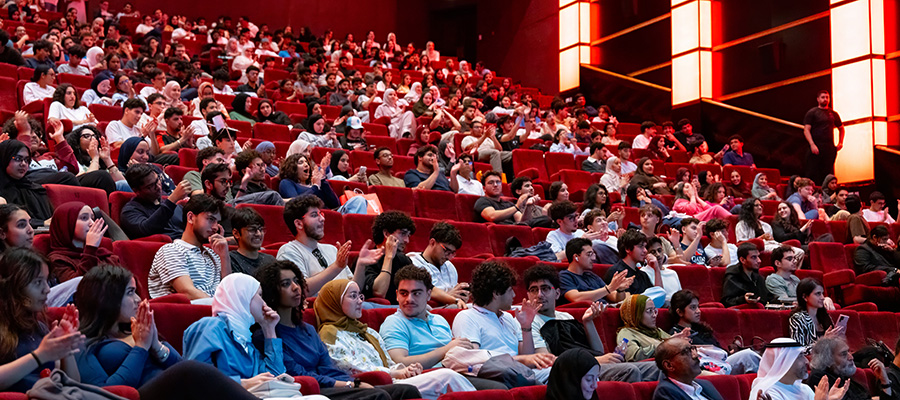- About
- Admissions
- Study at AUS
- Prospective Students
- Bachelor's Degrees
- Master's Degrees
- Doctoral Degrees
- Admission Publications
- International Students
- Contact Admissions
- Grants and Scholarships
- Sponsorship Liaison Services
- Testing Center
- New Undergraduate Student Guide
- Undergraduate Orientation
- New Graduate Student Guide
- Graduate Orientation
- File Completion
- Payment Guide
- Students with Disabilities
- Executive and Continuing Education
- Academics
- Life at AUS
- Research
- Contact Us
- Apply Now
- .

Racing to the finish: AUS engineering students' miniature vehicles conquer sand dune
Miniature vehicles raced over a man-made sand dune to deliver a fragile cargo of water at the 29th edition of American University of Sharjah’s (AUS) NGN 110 Competition, a signature hands-on learning experience in the College of Engineering (CEN).
Held each semester, the NGN 110 competition is a core component of CEN’s curriculum. This term’s edition brought together more than 600 first-year students working in 119 teams. Tasked with designing and building a vehicle that could traverse a sand dune and reach the bottom of a ramp while keeping an unrestrained and delicate water-filled payload intact, students had to blend creativity with rigorous engineering thinking. Along the way they engaged with the course’s key themes of teamwork, design thinking, ethics, sustainability and the real-world application of technical knowledge.
What made this edition distinctive was its relationship to the local environment. Instead of using abstract problems or scenarios borrowed from other contexts, the challenge was inspired by the sand dunes of Sharjah and the practical realities of moving goods across shifting terrain. Vehicles were evaluated on their weight, their speed down the ramp and how much of the water payload they could safely deliver, pushing students to design solutions that were light, efficient and resilient at the same time.

“This competition is where, from the very beginning of their university journey, our students start developing their technical and soft skills,” said Dr. Fadi Aloul, Dean of CEN. “Through experiences like NGN 110, we aim to embed skills needed by every engineer and computer scientist, including multidisciplinary teamwork, leadership, clear communication and presentation, time management and practical problem solving. By grounding the challenge in our own environment and asking students to design solutions that respond to the needs of this region and beyond, we are preparing them to become confident, responsible engineers.”
As event organizer, Dr. Bayan Hamdan, Assistant Professor of Industrial Engineering, emphasized how intentionally the competition mirrors the realities of professional engineering work.
“From day one we want our students to experience the full engineering cycle: framing a real problem, working within tough constraints and iterating until the design performs,” she said. “They had to contend with sand, friction, gravity and a very unforgiving payload. Watching them test, fail, redesign and succeed together shows how quickly they are learning to think and act like engineers. NGN 110 is not just an introductory course; it is their first real step into the profession.”
The judging panel brought together faculty from across CEN, including Dr. Ahmed Ibrahim, Visiting Assistant Professor of Mechanical Engineering; Dr. Karnail Singh, Senior Lecturer in Chemical Engineering; Aqeel Ahmed, Professor of Practice in Civil Engineering; Dr. Ming Teng, Senior Lecturer in Electrical Engineering; and Dr. Ammar Hasan, Professor of Practice in Electrical Engineering.
After a full day of test runs, refinement and final attempts, several teams emerged as winners and took home cash prizes.
First place went to Rec 6 Group 4, whose carefully balanced design combined stability with speed. The team members were Sara Abdelaziz Alzarooni, Moza Khalid Bin Kalban, Omar Mohamed Hanbal, George Shinod Palayoor and Kishan Girish.
For the winning team, the experience was about much more than a trophy or prize money.
“We are thrilled to have won first place, but what meant the most to us was how much we enjoyed this year’s competition. It really brought us together as a team, as we leaned on one another and on the guidance of our instructors every step of the way. This experience allowed us to apply what we learned in the classroom and gave us a much clearer understanding of the engineering process in real life,” said Bin Kalban.
Second place was awarded to Rec 7 Group 4, formed by Misbah Shanavas, Layan Hani Abu Jamous, Rayyan Saleh Alhammadi, Karam Murad Almakhamreh and Omran Rashid Almualla.
Third place went to Rec 5 Group 5, made up of Latifa Mansour Alzarooni, Shahd Ramy Marey, Samir Ashraf Anab, Yazan Mohammad Abuarja and Laith Emad Hamad.
Fourth place was claimed by Rec 13 Group 2. The team of Tala Kseiri, Mariam Ahmed Hammad, Ghala Rashed Alshamsi, Tarek Ahmed Aboulkheir, Mahad Bin Asim and David Alexander Biser received fourth prize.
Fifth place went to Rec 13 Group 4. The team included Nusaiba Nimat, Isha Thakur, Abdalrahman Fahad Aljaber, Abdulla Firas Sarraj and Hamad Marwan Almheiri.
Two special awards recognized standout aspects of design and creativity, with both teams receiving cash prizes. The Most Innovative Design award went to Rec 19 Group 1, with members Ihsen Dhaouadi, Asma Mohamed Adnan Kari, Salma Omar Hassan, Nesandu Nimadith Wanni Arachchige, Adnan Imad Alsabbagh and Abdullah Ahmed Salem. Their vehicle impressed judges with its unconventional approach to protecting the payload while navigating the dune. The Most Aesthetic Design award was presented to Rec 16 Group 1, featuring Younis Sharief, Vanishri Shekhawat Salahaldeen, Manar Jamhour, Jaida Walied Abdullah Hussien and Younis Sherif Sherif, whose vehicle stood out for its thoughtful detailing and visual coherence.

Click here to learn more about CEN’s community of innovators.

